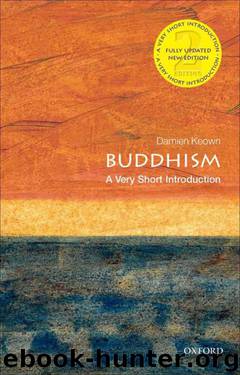Buddhism: A Very Short Introduction (Very Short Introductions) by Damien Keown

Author:Damien Keown [Keown, Damien]
Language: eng
Format: epub
Publisher: Oxford University Press, USA
Published: 2013-02-27T16:00:00+00:00
Sri Lanka
Beginning with the countries to the south, where Theravāda Buddhism predominates, the island of Ceylon—home to the modern state of Sri Lanka—has played a crucial role in preserving and developing Buddhist culture. According to the Buddhist chronicles preserved there, Buddhism was brought to Ceylon in 250 BC by a monk named Mahinda, an envoy of the emperor Ashoka. Mahinda and his fellow monks founded a monastic community at the Mahāvihāra (‘Great Monastery’) in the capital, Anurādhapura. It was in Sri Lanka some time around 80 BC that the Pali Canon was first written down, as a result of fears that the method of oral transmission would not survive due to warfare and famine.
One of the most famous residents of the island was the Indian monk Buddhaghosa who arrived in the 5th century AD. Buddhaghosa collated and edited the early commentaries on the canon and translated them into Pali. His status and influence may be likened to those of the Christian Church father Saint Jerome (347–420) who lived shortly before him and translated the Bible into Latin. Buddhaghosa’s classic work the Visuddhimagga or ‘Path of Purification’—a compendium of doctrine and practice—has remained a landmark in Theravāda literature.
From the earliest times Buddhism and politics have been entwined in the country’s history, and there has been a close reciprocal relationship between Church and state, or the Saṅgha and the king. Kings were consecrated by monks, and monks served as counsellors, interpreting Buddhist teachings for the ruler. Monks have retained considerable influence in public affairs down to the present day. Buddhism has undergone several periods of decline in the course of its history in Sri Lanka. Often these occurred in the aftermath of invasion—such as by Indian Tamils—or periods of civil unrest. On several occasions the ordination tradition for monks died out, and monks had to be sent for from Burma in 1065 and later Thailand in 1753 in order to restart it. Sri Lanka gained independence from the British in 1948, but in modern times has continued to be plagued by political problems and intermittent civil war between the Sinhalese Buddhist majority (numbering around 70 per cent) and the minority Tamil population in the north. At times Buddhist monks have fanned the flames by likening the dispute to a holy war and campaigning for discriminatory constitutional reform. This reached an extreme in 1959 when the prime minister, S. W. R. D. Bandaranaike, was assassinated by a Buddhist monk who felt his position towards the Tamils was too conciliatory. In 2009 Sinhalese government forces defeated the LTTE (Liberation Tigers of Tamil Eelam) but the country remains scarred by the violence and political upheavals of recent decades.
Download
This site does not store any files on its server. We only index and link to content provided by other sites. Please contact the content providers to delete copyright contents if any and email us, we'll remove relevant links or contents immediately.
| Buddhism | Christianity |
| Ethnic & Tribal | General |
| Hinduism | Islam |
| Judaism | New Age, Mythology & Occult |
| Religion, Politics & State |
Cecilia; Or, Memoirs of an Heiress — Volume 1 by Fanny Burney(31320)
Cecilia; Or, Memoirs of an Heiress — Volume 3 by Fanny Burney(30927)
Cecilia; Or, Memoirs of an Heiress — Volume 2 by Fanny Burney(30884)
The Secret History by Donna Tartt(16606)
Sapiens: A Brief History of Humankind by Yuval Noah Harari(13035)
Leonardo da Vinci by Walter Isaacson(11892)
The Radium Girls by Kate Moore(10900)
Sapiens by Yuval Noah Harari(4526)
The Wind in My Hair by Masih Alinejad(4420)
How Democracies Die by Steven Levitsky & Daniel Ziblatt(4391)
Homo Deus: A Brief History of Tomorrow by Yuval Noah Harari(4271)
Endurance: Shackleton's Incredible Voyage by Alfred Lansing(3831)
The Silk Roads by Peter Frankopan(3749)
Man's Search for Meaning by Viktor Frankl(3620)
Millionaire: The Philanderer, Gambler, and Duelist Who Invented Modern Finance by Janet Gleeson(3565)
The Rape of Nanking by Iris Chang(3505)
Hitler in Los Angeles by Steven J. Ross(3429)
The Motorcycle Diaries by Ernesto Che Guevara(3325)
Joan of Arc by Mary Gordon(3252)
